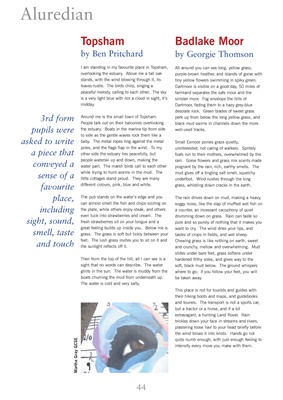
Aluredian
44
3rd form
pupils were
asked to write
a piece that
conveyed a
sense of a
favourite
place,
including
sight, sound,
smell, taste
and touch Topsham
by Ben Pritchard
I am standing in my favourite place in Topsham,
overlooking the estuary. Above me a tall oak
stands, with the wind blowing through it, its
leaves rustle. The birds chirp, singing a
peaceful melody, calling to each other. The sky
is a very light blue with not a cloud in sight, it's
midday.
Around me is the small town of Topsham.
People talk out on their balconies overlooking
the estuary. Boats in the marina tip from side
to side as the gentle waves rock them like a
baby. The metal ropes ting against the metal
poles, and the flags flap in the wind. To my
other side the estuary lies peacefully, but
people waterski up and down, making the
water part. The marsh birds call to each other
while trying to hunt worms in the mud. The
little cottages stand proud. They are many
different colours, pink, blue and white.
The pub stands on the water's edge and you
can almost smell the fish and chips sizzling on
the plate, while others enjoy steak, and others
even tuck into strawberries and cream. The
fresh strawberries sit on your tongue and a
great feeling builds up inside you. Below me is
grass. The grass is soft but tickly between your
feet. The lush grass invites you to sit on it and
the sunlight reflects off it.
Then from the top of the hill, all I can see is a
sight that no words can describe. The water
glints in the sun. The water is muddy from the
boats churning the mud from underneath up.
The water is cold and very salty.
Badlake Moor
by Georgie Thomson
All around you can see long, yellow grass,
purple-brown heather, and islands of gorse with
tiny yellow flowers swimming in spiky green.
Dartmoor is visible on a good day, 50 miles of
farmland separates the safe moor and the
sinister moor. Fog envelops the hills of
Dartmoor, fading them to a hazy grey-blue
desolate rock. Green blades of sweet grass
perk up from below the long yellow grass, and
black mud swims in channels down the more
well-used tracks.
Small Exmoor ponies graze quietly,
uninterested, not caring of walkers. Spritely
foals run to their mothers, overwhelmed by the
rain. Gorse flowers and grass mix scents made
poignant by the rain, rich, earthy smells. The
mud gives off a tingling salt smell, squelchy
underfoot. Wind rustles through the long
grass, whistling down cracks in the earth.
The rain drives down on mud, making a heavy,
soggy noise, like the slap of muffled wet fish on
a counter, an incessant cacophony of quiet
drumming down on grass. Rain can taste so
pure and so purely of nothing that it makes you
want to cry. The wind dries your lips, and
tastes of crops in fields, and wet sheep.
Chewing grass is like nothing on earth, sweet
and crunchy, mellow and overwhelming. Mud
slides under bare feet, grass softens under
hardened filthy soles, and gives way to the
soft, black mud below. The ground whispers
where to go; if you follow your feet, you will
be taken away.
This place is not for tourists and guides with
their hiking boots and maps, and guidebooks
and tourers. The transport is not a sports car,
but a tractor or a horse, and if a bit
extravagant, a hunting Land Rover. Rain
trickles down your face in streams and rivers,
plastering loose hair to your head briefly before
the wind blows it into knots. Hands go not
quite numb enough, with just enough feeling to
intensify every move you make with them.
Martha Gray GCSE